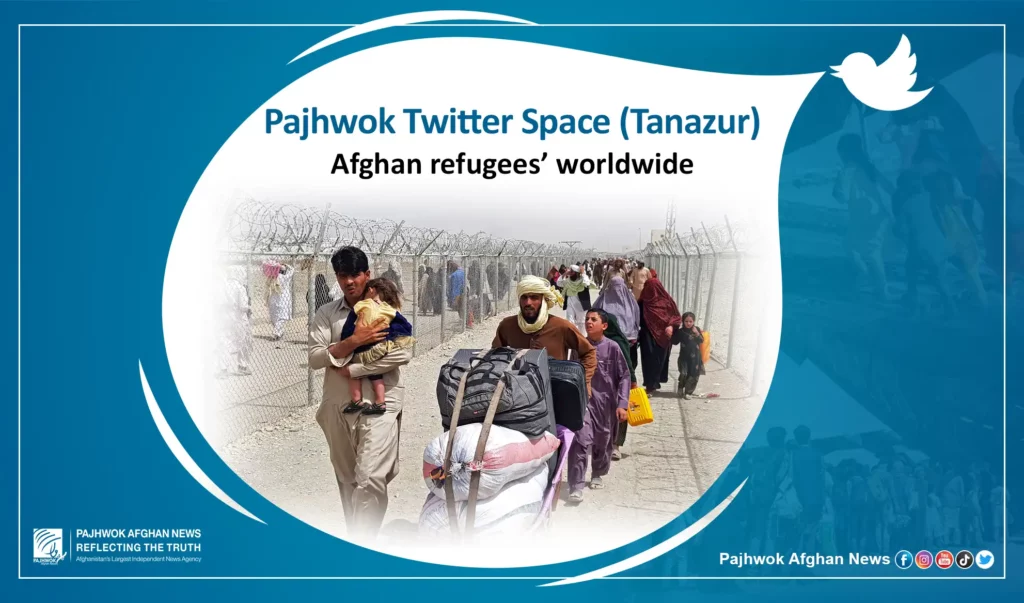KABUL (Pajhwok): The migrant crisis and problems Afghan refugees face in the world were discussed in Pajhwok’s Twitter space topic, with participants urging the acting government to defend the rights of its citizens and do away with causes behind migration.
About 1,500 people listened the debate that started at 8:00pm (Afghanistan time) yesterday and lasted two hours. About 16 people took part in the discussion and dozens of others shared their opinions in writing.
What problems Afghan refugees face in different countries?
At the start of the discussion, representatives of refugees in different countries highlighted problems of refugees.
Zahir Pashtun, a refugee rights activist in Pakistan, said Afghan refugees in the neighboring country faced serious problems amid another wave of migration.
He said Afghan refugees living in Pakistan were struggling with problems in the fields of residence documents, health, education and work and they were often harassed by police.
He complained no Afghan government had done anything to protect the rights of refugees and solve their problems in Pakistan.
Hadi Ghaffari, a refugee living in Islamabad, also said that Afghan refugees in Pakistan faced problems in areas of passports and visas. He said children of Afghan refugees were not enrolled in schools, they could not open bank accounts.
He added forced deportation of Afghans, economic problems and lack of right to education were the most serious problems of refugees.
Mursalin Omari, an Afghan refugee in Iran, said Afghan migrants in the neighboring country were forced into hardest work that Iranians could not do.
Abdullah Nawabzada, a member of the Afghan refugee community in Greece, spoke about the problems of refugees in European countries.
He said Afghan refugees living in Europe were in a bad situation as most of them were imprisoned, drowned in water or forced to return to their own country.
He continued even Greeks hardly found work in their country and for Afghans it was very difficult to a job and many refugees were forced to collect papers and bottles to find one time meal and even forced into ‘prostitution.’
Responsibilities of government and international institutions
International relations analyst Ustad Zahid Amrakhel said the refugee crisis started more than four decades ago in Afghanistan mainly due to security, political and economic problems.
He added rights of refugees were basic human rights. The 1951 Refugee Convention on and its 1967 protocol defended the rights of refugees, including their right to work, education, humanitarian aid, freedom of religion, access to justice centers, freedom of movement and having identification documents for travel.
He continued around 164 countries of the world were members of this convention and it was their responsibility to implement the accepted laws related to refugees.
It was the basic duty of governments to defend the rights of their citizens, give them the same rights at home and provide them with the same services.
Amarkhel mentioned another problem that the current caretaker government had not yet started official interaction with the world and as a result Afghanistan’s embassies abroad remained closed.
Subhanullah Mesbah, the vice president of the American Association of Legal Scholars in Chicago, said that Afghan refugees were discriminated against in many countries, but this problem was serious in Pakistan and Iran.
He added legally when a person denied access to justice, his human rights were not protected. Refugees also have a number of rights that must be respected.
Outcome
The participants and guests of the discussion said that Afghan refugees were deprived of the basic rights of life all over the world such as residence documents, work, education, health, etc and these problems were serious in Pakistan.
They asked the current caretaker government to defend the rights of its citizens and do away with the causes of migration.
They also asked the international community to work together to implement the 1951 Convention and its 1967 Protocol.
ma
Views: 190









GET IN TOUCH
NEWSLETTER
SUGGEST A STORY
PAJHWOK MOBILE APP